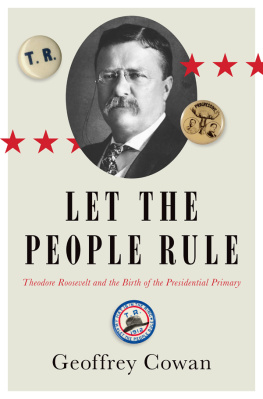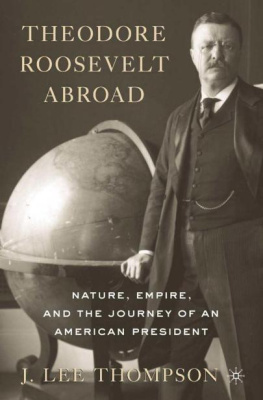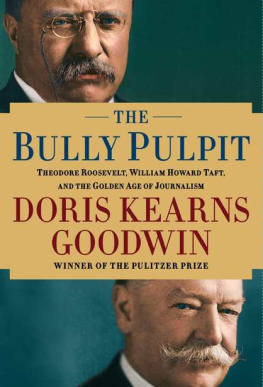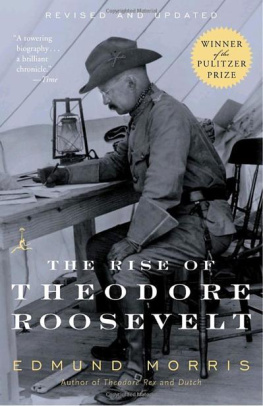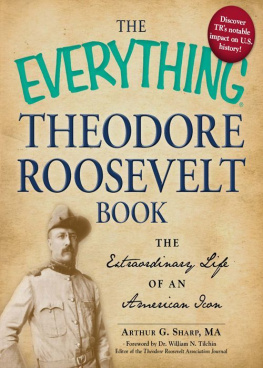
LET THE
People Rule

THEODORE ROOSEVELT AND
THE BIRTH OF THE
PRESIDENTIAL PRIMARY
Geoffrey Cowan

W. W. NORTON & COMPANY
Independent Publishers Since 1923
New York | London
ALSO BY GEOFFREY COWAN
The People v. Clarence Darrow:
The Bribery Trial of Americas Greatest Lawyer
See No Evil:
The Backstage Battle over Sex and Violence in Television
With the help of material from dozens of previously unknown and unused manuscript collections, this book provides a fresh perspective on the 1912 campaign, the birth of the presidential primary, and Theodore Roosevelts decision to exclude black delegates from the Deep South from his Progressive Party Convention. Contemporary news accounts; the diaries, letters, and memoirs of his most important supporters and allies; as well as unpublished letters by and to Roosevelt make it possible to understand his motives and the events of the era with a fresh eye.
Some newly unearthed letters, including those of Ormsby McHarg, one of Roosevelts key political operatives, were in private hands; others were in locations seldom visited by TR scholars, such as the letters of Arthur Hill, a Roosevelt acolyte who later became a distinguished Boston lawyer, which are at the Portsmouth Athenaeum in Portsmouth, New Hampshire; others had remained unused in huge collections, such as the constant stream of intimate political reports from Franklin Knox, the former Rough Rider who, as his friend and the chair of the Michigan Republican Party, carried out secret missions for TR during the 1912 campaign. After the campaign, Knox purchased a paper in New Hampshire that became known as the Manchester Union-Leader, later moved to Chicago, where he published the Chicago Daily News, ran for Vice President in 1936 as Alf Landons running mate, and, after the United States entered World War II, served as Franklin Roosevelts Secretary of the Navy. The Knox letters are in the papers of Governor Chase Osborn at the Bentley Historical Library at the University of Michigan. Still other letters have been held under seal, such as the volumes of notes and letters about the 1912 campaign marked highly confidential that were collected by TRs Harvard classmate and friend Charles Washburn. Those documents were unavailable to researchers and readers until the librarians at the American Antiquarian Society Library in Worcester, Massachusetts, agreed that they could be released since more than seventy-five years had passed since the death of most of those involved, including Washburn, Roosevelt, and Henry Cabot Lodge.
In addition to George Mowrys Theodore Roosevelt and the Progressive Movement, which helped spark my interest in primary reform in 1968, the events of the era are covered in a range of memoirs of participants and studies of TR, Taft, La Follette, and other leaders of the era. There are hundreds of excellent scholarly works, including some unpublished doctoral dissertations. I benefited enormously from the vast library of more recent books about Theodore Roosevelt, several of which treat some aspect of the 1912 campaign. Among the most relevant are James Chaces 1912: Wilson, Roosevelt, Taft, and DebsThe Election That Changed the Country; Patricia OTooles When Trumpets Call: Theodore Roosevelt After the White House; Lewis Goulds insightful Four Hats in the Ring: The 1912 Election and the Birth of Modern American Politics; Edmund Morriss Colonel Roosevelt, the third volume in his splendid trilogy; and Doris Kearns Goodwins Bully Pulpit: Theodore Roosevelt, William Howard Taft, and the Golden Age of Journalism, a unique blended study of the press, history, and politics.
There are countless more general discussions of the institution and development of the primary election, including Byron Shafers Bifurcated Politics: Evolution and Reform in the National Party Convention and Quiet Revolution: The Struggle for the Democratic Party and the Shaping of Post-Reform Politics; Rhodes Cook, The Presidential Nominating Process; James W. Davis, Presidential Primaries: Road to the White House; Alan Wares The American Direct Primary; and Louise Overackers The Presidential Primary.
Although no book has explored the story of the black delegates from Mississippi to the 1912 conventions and TRs motives for excluding them, books that have proved invaluable include Casdorph, Republicans, Negroes, and Progressives in the South, 19121916; Smith, Emancipation: The Making of the Black Lawyer, 18441944; Sewell and Dwight, Mississippi Black History Makers; McMillen, Dark Journey; Jackson, A Chief Lieutenant of the Tuskegee Machine: Charles Banks of Mississippi; Hobbs, The Cayton Legacy; Hamilton, Beacon Lights of the Race; Sinkler, The Racial Attitudes of American Presidents; and Bradley, The Imperial Cruise.
One of the great joys of using original material in writing history is the chance to engage in a form of time travel by reading letters and journals, some of which have never been used before. A number of manuscript collections, maintained by archivists who are often the unsung heroes of the historians craft, provided large quantities of personal correspondence between the major political figures and players in the 1912 presidential primary campaigns. The Library of Congress houses the papers of many important political figures whose dealings are detailed in this book, including Theodore Roosevelt, William Howard Taft, Amos Pinchot, Gifford Pinchot, Albert J. Beveridge, James R. Garfield, and Elihu Root. While most of TRs important outgoing correspondence has been published in Morisons eight-volume Letters of Theodore Roosevelt, his unpublished and seldom-consulted incoming correspondence is almost equally interesting. The Charles Dewey Hilles Papers at Yale University, Hiram W. Johnson Papers at the University of California, Berkeley, and the Papers of Ormsby McHarg, held in the private collection of Paul A. Ryan, each proved highly useful in constructing a narrative of the primary campaign from the writings of participants in both TRs and Tafts campaigns. Other valuable collections include the Henry Cabot Lodge Papers at the Massachusetts Historical Society; the William Kent Family Papers at Yale University; the Papers of Arthur Hamilton Lee at the University of London; the Francis J. Heney Papers at the University of California, Berkeley; the George Walbridge Perkins and Herbert Parsons Papers at Columbia University; the John Milliken Parker Papers at the University of Louisiana at Lafayette; the Charles Grenfill Washburn Papers at the American Antiquarian Society; the Frank B. Kellogg Papers at the Minnesota Historical Society; the E. W. Scripps Papers at the Ohio University Library; the Chase S. Osborn Papers at the University of Michigan; the Herbert S. Hadley Papers and the Western Historical Manuscripts Collection at the University of Missouri; the Nicholas Roosevelt Papers at Syracuse University; the Arthur Dehon Hill Family Papers at the Portsmouth Athenaeum; the Miles Poindexter Papers at the University of Washington; the William E. Glasscock Papers at West Virginia University; and the Joseph M. Dixon Papers at the University of Montana. A number of those involved in the events of the era left useful oral histories, among them Ormsby McHarg and Stanley Washburn.
Throughout the process, I have been aided immeasurably by outstanding research assistants, starting with Jeff Berry, who logged countless hours at the Library of Congress and elsewhere and helped me to find doctoral students and others who had the time and stamina to plow through papers and libraries around the country and, in one case, England.
Next page
